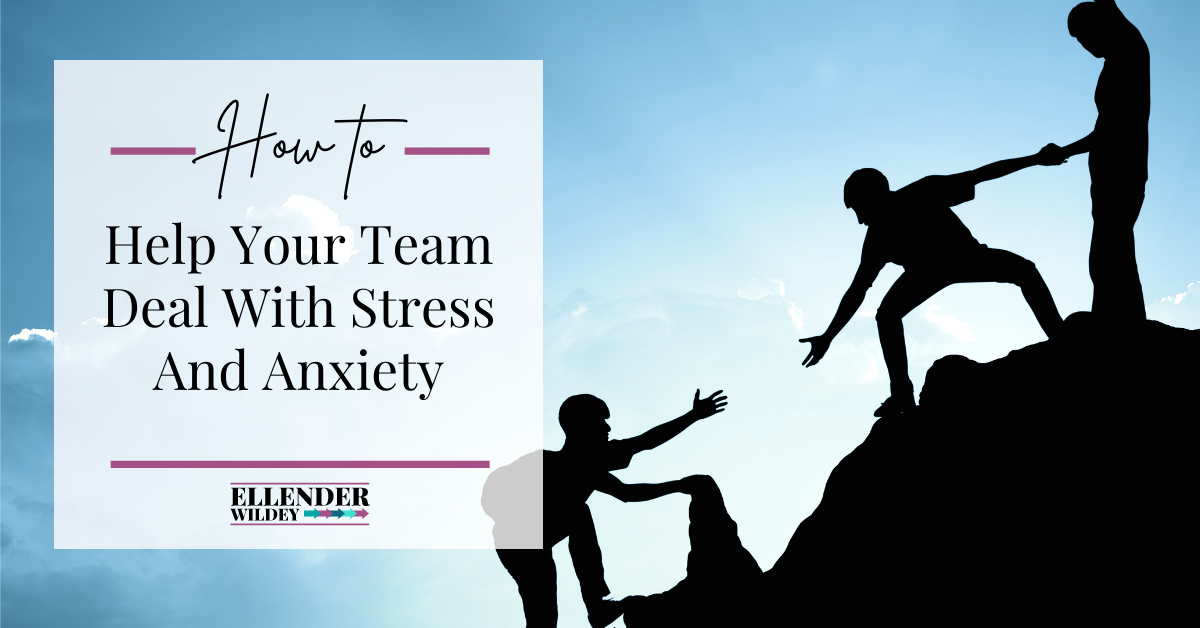Dealing with stress is something that we are all likely to have experienced in our lives. Even more so over the last two years due to the incredible changes that we have had to face due to Covid. To understand how you can help your team to deal with stress and anxiety, we need to firstly understand what they each mean. Secondly, how you can then help to prevent it from becoming a problem in your organisation by supporting the mental health and well-being of your team .
What is stress?
When we say “I’m stressed” or “this is stressful”, we may be feeling under pressure due to workload, situations or an event. Perhaps we have lots to do, think about, or don’t have much control over what happens. When we are stressed there are physical signs, like tiredness, headaches or an upset stomach. This is because when we feel stressed emotionally, our bodies release hormones called cortisol and adrenaline.
Feelings of stress is our reaction to being placed under pressure with demands placed on us that we find difficult to cope with. We’re all different, so a situation that doesn’t affect you may cause someone else a great deal of stress.
Signs of stress at work could mean that a person could appear angry, tearful or withdrawn – obvious signs that they are not coping. Deadlines are being missed, mistakes are being made. The feeling of overwhelm will mean that it is harder for a person experiencing stress from performing and, at worse will ‘burn-out’. It is vital that they receive support and understanding.
What is anxiety?
Anxiety is a natural reaction that everyone experiences from time to time. These feelings can range from a mild uneasiness to having a full blown panic attack. Although anxiety can be very unpleasant, there are times when it can be helpful, such as, to avoid dangerous situations or to motivate problem solving. So, like stress it can sometimes be helpful to someone.
Anxiety is mostly a reaction to a perceived threat that occurs in the person’s environment. The difference between everyday anxiety and an anxiety problem is the severity and how long it lasts. Anxiety becomes a problem when it is severe enough to impact our ability to function at work or other aspects of our life. It can affect people physically, psychologically and behaviourally.
Signs that a person is experiencing anxiety are much like those of a person with stress – you may also notice shaking, sweats, irritability, fear. The list is quite exhaustive of the range of symptoms that they may be experiencing.

Helping your team to deal with stress and anxiety
What ways can you help your team? There are a number of achievable ways that start with how you manage your staff, how you deal with situations and how you encourage open conversations.
1. Form clear strategies for each working day
By being organised with clear goals and realistic deadlines for your team, you will help them feel less pressure. When we know what is expected of us and what role we have to play on any given day, it allows us to be in better control of our time and workload. As many people are still working from home, this is more important so that feelings of stress can be alleviated. Clear strategies help us remain more calm and focussed.
Consider the workload of your staff and ensure it is manageable and balanced in comparison to their colleagues.
2. Communicate with empathy and compassion
When communicating with your team, take the time to understand their viewpoint of a situation. If it is apparent that they are struggling with stress, talk to them with compassion. Consider when and where you have your conversation and put yourself in their shoes in order to empathise fully with them.
During my mental health training, I help participants understand the importance of empathy, how it differs from sympathy and how early intervention helps to prevent situations from getting worse. When support is given through open communication, your team will feel valued and understood.
3. Positivity before negativity helps stressful situations
By focusing on what is going well and the positive achievements are talked about, it lifts the spirits and takes the pressure off of people. Even if it is necessary to discuss less positive matters, consider the language you use. When we lead by example with how we talk and what we say, it can help alleviate feelings of pressure even when work is busy and deadlines are looming.
Try to avoid commands like ‘have to’, ‘should’, ‘must’, ‘need to’ when addressing your team as this can immediately put them under pressure, as opposed to when using alternative vocabulary. Think more ‘can’, ‘could’, ‘try’. These changes are subtle, but if you try it out it may just surprise you! This type of language is just as important when we are speaking to ourselves
4. Encourage mindfulness and well-being at work
There are many different ways to promote well-being that you can encourage your staff to try. In my blog, 7 steps to improve your mental health and well-being, I explore in detail about everything from healthy eating to spending time outside and reaching out for help.
You could introduce some of these steps into the workplace so that you can work on some together. This could be, for example, Fresh Fruit Fridays, replacing coffees for infused water or setting up an activity that you could do together – chair yoga, lunchtime power walks! Why not encourage your staff to suggest activities and change things around each month? This type of group activity can help create positive bonds, alleviate stress and is good for team building. By knowing each other better, you are more likely to know when things are out of character.
There are different websites apps such as Calm and Headspace that can help through meditation that some of your team could use to help them relax. Also, the NHS has some great advice through their Every Mind Matters campaign which is very useful. In some larger organisations, mental well-being support tools may already be in place. So make sure that you are aware of them and let your team know too.
5. Implement Mental Health training for your team
Although stress and anxiety are common, often the symptoms can worsen and begin to develop into a mental health challenge. By implementing mental health training your team will learn to understand the warning signs and changes of behaviour that can indicate a struggle with mental health. The benefits of the training mean that there will be less stigma in your organisation and more understanding of how normal and commonplace mental health problems are.
Through education, you can be confident that it is much more likely that any of your team can reach out for help knowing that they will be listened to and supported. Your team will understand the warning signs and be comfortable and confident to know how and when to start the conversations.
Take a look at my other articles including How to build a mentally healthy workplace for more information on what steps you can take for your organisation to help your team.
How I can help your team to deal with stress and anxiety through training
Do you want to support your employees with their mental health but don’t know where to start? This is where I can help you and your organisation through the training I provide.
By training people in Mental Health Awareness and Mental Health First Aid, I am part of the movement to raise awareness and begin to end the stigma surrounding mental health. My mission is to work towards ensuring every community and all workplaces have a network of people who are trained in mental health.
I help organisations strengthen their mental health strategy in the workplace to help save their money that is lost due to staff absence, staff loss and, therefore, the need for and cost of recruitment and training of new staff because of stress and mental health related illness.
Get in touch with me and we can discuss which training course would suit your organisation best. Let’s start the training journey that will help your team deal with stress and anxiety and support each other.







